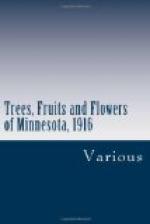About this time, there originated in Wisconsin a berry known as the Loudon. A committee of nurserymen having gone to see this variety returned with the report that the half had not been told concerning this great berry. Wanting to keep up with the times, I decided to plant some of this variety in the spring. The yield from these plants was immense, and the berries large, but unlike the Marlboro already mentioned they could not be picked until very dark and real ripe. This variety was more subject to anthracnose than any I had seen, and served to give me a thorough understanding of the various raspberry diseases, which I had heretofore blamed to the drouth. The leaves would dry up and the berries become small and crumbly when affected by anthracnose. It might be said of this variety as regards public favor, that it went up like a rocket and came down equally fast.
I next tried the Thompson Early as an experiment, but this variety proved a failure, or at least a disappointment. These berries ripened very slowly, just a few at a time, and did not compare favorably with either the Marlboro or the Loudon.
A party close by had at this time planted out a large field of a variety of raspberry which I had not seen before. These plants produced a large berry, more like a blackberry in appearance. Having by this time had experience with so many kinds of raspberries, I examined this new variety carefully, and all in all decided that this was the coming berry. Here, too, I also noticed the first signs of disease. The plants had only begun to bear fruit, however, and judging from the strong, tall canes, they looked good for at least fifteen years. This disease, however, practically destroyed the entire field within two years. Before too badly diseased, I had obtained and planted out a couple of acres of these plants and immediately began spraying them. The following spring I sprayed them again, and although the plants became perfectly healthy, I sprayed them once or twice during the summer, and it is needless to say the result was a berry which, considering all its good points, was certainly deserving of the name it bore, which was “King.” In fact, I do not hope to see anything better in the raspberry line during the next thirty years, that is, any seedling having all its merits: a strong growth, hardiness of cane, an immense bearer and a good shipper. It’s only fault is that the berries will drop from the plants when real ripe, but if you are on the job this can easily be averted.
As far as anthracnose is concerned, I have found that there is not a variety of raspberry standing out in an open field, unsprayed or partly shaded, that will stand up under a heavy crop without being affected by this disease.




